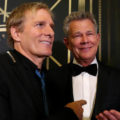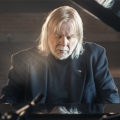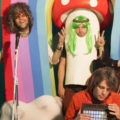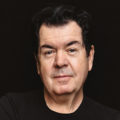Man at work: Colin Hay on rescheduling, fire relief “Down Under,” writing for Ringo
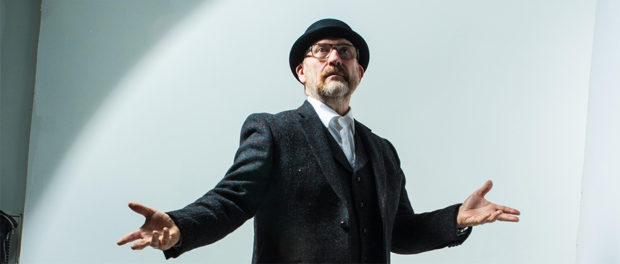 Photos provided by Sebastian Smith
Photos provided by Sebastian Smith
Right about now, Colin Hay was supposed to be winding his way around America, unloading more than 30 years of solo selections from sources such as the “Garden State” soundtrack and his latest long player “Fierce Mercy,” alongside a handful of Men At Work hits.
Instead he’s at home like everyone else, rescheduling that solo run, contemplating COVID-19, while raising attention for the ongoing needs stemming from a series of devastating brushfires in the land “Down Under.”
The Scottish–Australian singer, songwriter and sometimes actor now residing in Los Angeles called Chicago Concert Reviews (who resisted the urge to answer “Who Can It Be Now?”) for an overview of those observations, plus what those with extra viewing time can hopefully take away from his documentary “Waiting For My Real Life,” being a long-running member of Ringo Starr’s All-Starr Band and writing the title track for that Beatle’s new album “What’s My Name?”
A lot of artists seem to be moving their spring dates to later in 2020, but tell us a bit about your decision to simply bump your entire tour ahead to 2021.
Colin Hay: According to my booking agent, it’s really the only time I could do it. I couldn’t move it to the fall because I’m not available in the fall to do some touring. The next time I’m available to do it is the same time next year. I also think that the fall is still going to be relatively unpredictable in terms of what’s going to be going on with the coronavirus.
 You were planning on offering meet and greet packages to benefit Australian fire relief. How can fans support that cause in the meantime and what are the current needs with that situation?
You were planning on offering meet and greet packages to benefit Australian fire relief. How can fans support that cause in the meantime and what are the current needs with that situation?
Hay: I’m supporting to this town called Cobargo, which is through a GoFundMe recovery fund on my website. They’re trying to rebuild the town. There’s many, many charities that you can check out and there’s so many people that need help. It was a devastating fire. Sometimes people lost everything, which is something you have to cope with for the rest of your life. There’s the devastation of that and some people lost their lives. There are all kinds of physical needs, rebuilding buildings and there’s billions of wildlife that’s been lost. A great place to put some money into is helping people who are actually on the front lines of bringing back the wildlife.
Can you give us a preview of what to expect when the concert does finally come to Chicago?
Hay: Not really, no. I can’t really because it’s a year away. I already started the tour and it was going really well, but by that time, I’ll definitely have a new record out, so probably a lot of newer material that I’m working on at the moment that’s not released yet. I think it will be the best that I’ve had to offer in terms of live performances to date. But at the moment, I’m not really even thinking so much about that. I’m just thinking about the issue of our lifetime that’s going on right now. People are getting very sick, people are dying, it’s horrendous.
Would you prefer not to talk about musical subjects? We’ve been trying to give people alternate reading just because the news is so heavy right now, not to make light of it by any means, but to give people shows to look forward to and suggestions about what music to play. It’s tricky.
Hay: It’s an interesting area to talk about. On one hand you think to yourself, “it’s good to talk about other things” because people like to have something to look forward to. But at the same time, this is where we are and there’s a lot to be said for sitting in it and going “okay, what is this? How did we get here and how can we not let this happen again?”
There’s lots of other unconsciousness going on with people and there’s an awful lot of denial as well. It’s so frustrating looking at the way people can’t even deal with looking at the truth of something. People are dying, in reality, lots of people are dying. Lots of people are not getting the help that they need. People keep saying this is the richest country in the world, but at the same time it doesn’t surprise me because…the vast majority of people in the country are not represented. It’s taken something like this to happen to make a lot of people aware of that and it’s going to get worse before it gets better. I think that there’s a lot to be said for just being in the moment and going “okay, let’s keep our hands clean, let’s keep our distance and let’s reflect on where we are.”
There’s plenty of time to look forward because we always do. We will get through it, but this is a very stressful time. In many other ways, we’ve created situations where I can concentrate on “this” now because I wasn’t doing “that” before. I was ignoring it, whether it’s fixing a piece of piping or whether it’s writing a song or whatever it is you’re doing, like cleaning up that room that you’ve been ignoring for so long. There’s lots of things to do where you are, not necessarily where you’re going to be in six months’ time.
Your songs have always been there for listeners, from basically the days of Live Aid onward. What types of stories have you heard of bringing hope and healing to people during difficult periods?
 Hay: I think it always starts off with yourself. You can’t really have any real lasting effect on anything unless you’re trying to heal yourself. When I first started going on the road, writing songs and making records after Men At Work, I remember particularly well I was kind of lost. I was abusing myself and dealing with an alcohol addiction. A lot of audiences really, really helped to heal me from that and gave me something to connect to and to hold onto and to feel nourished by. So in doing that, you put it out there and you realize, not even necessarily because you’re trying to, but you realize you’re connecting with people and people are responding to things you are saying or singing about or feeling.
Hay: I think it always starts off with yourself. You can’t really have any real lasting effect on anything unless you’re trying to heal yourself. When I first started going on the road, writing songs and making records after Men At Work, I remember particularly well I was kind of lost. I was abusing myself and dealing with an alcohol addiction. A lot of audiences really, really helped to heal me from that and gave me something to connect to and to hold onto and to feel nourished by. So in doing that, you put it out there and you realize, not even necessarily because you’re trying to, but you realize you’re connecting with people and people are responding to things you are saying or singing about or feeling.
That’s what’s really been happening with me for the last 30 years. The audiences that I have are second to none. They’ve given me such meaning over the years. At this particular point of time, I feel particularly grateful for them. I’m not worried about my audience, for example, coming to see me in a year’s time. I’m quite confident about that, because in a way we’ve been going through some of those things [together] over the years…I’m just fortunate to play on stage and give in a way that makes them feel something or feel better when they’re walking out then when they walked in.
One song that’s making folks smile a lot right now is the title track you wrote to Ringo Starr’s latest album, “What’s My Name?” What a blast! What’s the story behind the song?
Hay: What a blast, yeah! When I was going out on stage every night with Ringo in 2008, he always asked “what’s my name?” and people would go “Ringo!” So I thought “he’s gotta have a song called that!” I asked “have you got a song called ‘What’s My Name?’” and he said “no,” so I just wrote the song that night. It’s a bit of a long story and I’ll try to shorten it, but I wrote another song that I was gonna finish with him. I went up to his house, but actually finished the song, which was a bit of a mistake on my part. I just got excited that I was going to get to write with Ringo that I wrote a set of lyrics. I shouldn’t have bothered really cause he didn’t feel a part of the song and he asked “are you gonna record the song and put it on your record?” and I said “no, it’s your song” and [he said] “no, it’s your song. You wrote it, you record it.”
I had also written “What’s My Name?” at that particular time, but I never gave it to him because of that, so it just fell in the drawer in the studio for the last ten years. I didn’t see Ringo because I wasn’t a member of his band after 2008 until 2018. [Around that time], his videographer Brent Carpenter asked “do you have anything I can give to Ringo for his birthday? We’re putting together a video for him.” I said “I wrote a song for him called ‘What’s My Name?’ So he told Ringo, and just before he finished his last record, I went up to his house, played it for him acoustically in a room and he thankfully loved it, so we just recorded it there and then. It’s a great thing to have happened in my life. I’m very excited about it.
Ringo must really like you! Tell us a bit about that experience and how you managed to be one of the longest running All-Starr Band members.
Hay: I don’t know really. I just think it was more circumstantial rather than designed. I did 2003 and then I did a television thing with him. I didn’t do it again until 2008 and then there was a big, long, ten-year break. I missed it a little bit to be honest and I loved playing in the band. Of course, there were lots of options and lots of other musicians who loved to play that gig. I’m not quite sure who made the decision, but a couple years ago, they made the call. Graham [Gouldman] from 10cc did one [tour in 2018] and last year was Hamish [Stuart] from Average White Band, who I love and was with in 2008. I love this format. I love Gregg Rolie on keyboards. [He played at] Woodstock [with Santana] and is amazing. [Steve] Lukather [from Toto] is a monumentally talented guitar player and songwriter. Then there’s Gregg Bissonette and Ringo on drums and Warren Ham, who’s a great utility player and has been in the band for a number of years now. It’s a great group of people to play with for sure.

Photo by Andy Argyrakis
Hay: I think that the best part was when we were in ascension. I think [it’s always the most] exciting when you are taking off, when you’re on that path and you’re still in the upswing. I think the most exciting part was also when I realized that through Ron Strykert, the other guitar player and myself, we were gonna write songs that would really work. He opened a real door for me creatively back then in the late ‘70s.
And then the other part, the worst part, I would probably change the lack of an ability of Men At Work to communicate with one another in any real way. I think we could’ve talked our way through problems if we communicated them. I don’t know if the band would’ve lasted any longer, but I think that there’s a lot to be said about just basic communication skills. Getting to what the heart of the matter is and unraveling it and letting it go because we never did that and probably never will. And [keyboard/saxophone/flute player] Greg [Ham] is gone. He was a friend of mine before the band and he was a friend of mine after the band up until he died. It was short-lived and very explosive. It came, did its thing and had lasting reverberations, but ultimately it wasn’t to be in terms of going the distance for a length of time with that particular group of people.
You brought Men At Work back to Europe in 2019. Will that ever come to America?
Hay: It’s the same band that I’ve had here in L.A. for a number of years, it’s just that I called it Men At Work. All we did was a Men At Work set list. If I didn’t go out as Men At Work, then I couldn’t have gone to Europe. [I asked the promoter] “can I have my band with me from the States?” and he said “if you called it Men At Work, we could do it.” So I thought about it and then I just felt “well, I’ll try it and see.” It was just basically the same band with a whole set list of Men At Work and it was great. I might do it here, but basically when people come and see me [in America for a full band show], they’re going see that band and there will be six or seven Men At Work songs anyway. People are asking for that when they come and see a show.
How do you keep classics like “Who Can It Be Now?” and “Down Under” fresh after so many performances?
Hay: You’re assuming that you’re [the artist] is the important thing. You’re not important in this scenario. It’s the song that’s important…So if you take it in that mix, then it always works because it’s not about you. It’s about the song and the people who are there who paid the money to see you. It’s not really about you. “Well, how do you keep it fresh?” The song is always fresh. The song is always there. It exists in its own brilliance. You just have to let it be that and get out of the way. (Laughs).
With everyone having ample time around the house these days, I imagine views of “Waiting For My Real Life” are up. What do you hope people take away from that documentary?
Hay: I think that’s the whole idea isn’t it? The fact that we always think that our lives have either happened or they’re happening down the road. I always find it slightly hazardous to express, but I’m just constantly reminding myself that this is the moment that we’re in. There is no other moment. I always have to remind myself of that because otherwise I can just let time go by. And you only have a finite amount of it, so it’s important to let yourself be in the moment.
Colin Hay performs at Thalia Hall on Mar. 28, 2021. For additional details, visit ColinHay.com and ThaliaHallChicago.com.



